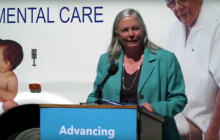|
Senators Fran Pavley and Bob Hertzberg join women’s health advocates to discuss the significance of Gov. Brown’s signing of SB 999, a new law that will make birth control more effective, consistent and convenient for California women. Thursday, Sept. 29, 12:30 p.m., El Proyecto Del Barrio health center, Winnetka, CA. List of speakers: Celinda Vazquez, Vice President of External Affairs, Planned Parenthood Los Angeles (emcee) Corinne Sanchez, President/CEO, El Proyecto Del Barrio Senator Fran Pavley Senator Bob Hertzberg Amy Moy, Vice President of Public Affairs, Essential Access California (formerly the California Family Health Council) Rebecca Griffin, Assistant Director, NARAL Pro-Choice California Fran Pavley represents California’s 27th Senate District, which includes western portions of the Santa Clarita Valley. New law to allow 12-month prescriptions of birth control heralded as a win-win for women WINNETKA — Beginning next year, women in California will have one less thing to worry about. That advancement was made possible with the signing last week of Senate Bill 999 by Senator Fran Pavley, which will allow women to receive up to a 12-month supply of birth control. The ability to receive a 12-month supply will eliminate the need to return to a pharmacy every 30 or 90 days to refill prescriptions, reducing the possibility of temporarily not having access to contraception. Annual dispensing is recommended by leading health care experts, who cite research that has found consistent, reliable access to birth control reduces the incidence of unintended pregnancies by 30 percent. Health care providers say the new law will have an immediate impact by eliminating the stress many patients feel when they are unable to make their monthly or every-three-months appointments to renew birth-control prescriptions. Enactment of the new law was celebrated at a news conference Thursday by Senators Pavley and Bob Hertzberg, the bill’s principal co-author, who were joined by representatives of leading women’s health care organizations. “This new law will improve women’s reproductive health outcomes and also save money for employers, taxpayers and individuals,” said Senator Pavley. “It makes so much common sense that when several of my constituents asked me to carry this bill, many experts at first told me they assumed it was already the law.” In fact, the 12-month option had been available only to a small percentage of women enrolled in a public health care program called Family Pact. As a result of the new law, beginning Jan. 1 that option will become available to all California women with private or public health care insurance. “I am proud to be a principal co-author of this important measure, which expands on the Contraception Equity Act I fought hard for in 1999 to require California health plans to cover contraception prescriptions,” Senator Hertzberg said. “This is just plain common sense. By allowing women to receive a year’s supply of birth control, we are reducing the stress in women’s lives and helping to prevent unintended pregnancies. This is a big win-win.” An analysis of SB 999 by University of California medical researchers earlier this year estimated that the bill’s enactment would result in 15,000 fewer unintended pregnancies and save employers, consumers and government agencies a combined $42.8 million each year. Providing 12-month dispensation of contraceptives is recommended by federal health experts at the Centers Disease Control, and SB 999 was supported by leading physician groups, including the California Medical Association, the California Academy of Family Physicians and the American Congress of Obstetricians and Gynecologists. SB 999 was co-sponsored by three of California’s leading women’s health organizations, Planned Parenthood Affiliates of California, NARAL Pro-Choice California and Essential Access Health, formerly known as the California Family Health Council. “Thank you to Governor Brown and Senator Pavley for signing SB 999 into law,” said Celinda Vazquez, Vice President of External Affairs for Planned Parenthood Los Angeles. “This bill is another example of how California leads the nation in protecting and expanding access to women’s reproductive health care.” “This is a great victory for Californians and shows that our state respects reproductive freedom with actions, not just words,” said Rebecca Griffin, Assistant Director, California Programs for NARAL Pro-Choice California. “There is no such thing as economic security without reproductive freedom, and SB 999 provides that security for more California women.” “Women across our state need and deserve equal and consistent access to their prescribed birth control method of choice. Providing an annual supply of birth control is a clinical best practice and proven to work to help reduce risk for experiencing an unintended pregnancy,” said Amy Moy, Vice President of Public Affairs at Essential Access Health. “Starting next year, thanks to Senator Pavley’s leadership and the governor’s support, California women will be able to have one less thing to worry about and California has built on its role as a national leader in breaking down barriers to time sensitive women’s health care.” The news conference was held at the El Proyecto del Barrio Family Health Care Clinic in Winnetka, one of four such clinics in the San Fernando Valley that provide family practice medical services, obstetrics and gynecological care, children’s health care, immunizations and other health services, primarily to low-income families who have no other access to health care. “Senate Bill SB 999 provides the underserved patients of El Proyecto del Barrio clinics critical access to a 12-month supply of contraceptives, contributing to positive women’s health and well being,” said Corinne Sanchez, President and CEO of El Proyecto del Barrio, Inc. Under the law, women will be able to consult with their doctors and pharmacists to determine the duration of a prescription that works best for them. The prescription for a hormonal contraceptive – birth-control pills, the ring or the patch – can be for up to 12 months, which insurance plans would be required to cover. (c)2016 Sen. Fran Pavley | SCVTV
No Comments for Sen. Fran Pavley: Press Conf.: SB999, Annual Dispensing of Contraception
|







